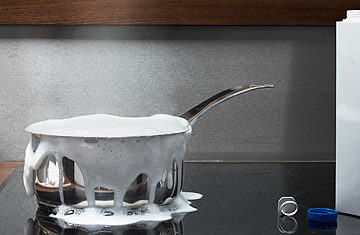
The arc of my upward mobility has come with a Faustian downside. I write for TIME now, but can't fill my pages with obscenity and personal invective. And I live in a "nice" apartment, which means I have traded in a gas range for a sleek, dark, unbroken plane of near-black ceramic glass, a chic abyss marred only by a few geometric circles, like those found left in crops by aliens. My wife Danit is crazy about it. So easy to clean! And from my exposure to any number of identical wannabe-upscale house and apartment kitchens around the country, I see where this is heading. And I'm not happy about it. Last week I ranted against gas barbecue grills, but in the kitchen, it's gas that takes the John Connor side in the war against the machines.
And see is the right word. This range is meant to please the eyes of people offended by disorder and process. It's never as much itself as when totally empty, clean and gleaming in the refrigerated modernist heaven of modern aspirational living. (It's like those tables that only look right when there is a bowl with exactly three lemons in it.) Dark and clean, and easily swipeable with some type of appropriately hip cleaner, it's made of a nearly unbreakable ceramic that radiates a relatively large part of the electromagnetic spectrum. But beneath it are essentially the same crappy electric coils that were the disgrace of efficiency apartments in the '70s.
I don't hate these ranges because they're fashionable or unfashionable either. I just hate them because they're hard to cook with. Cooking is, along with talking and copulation, the most elemental human act I can think of, so I always feel a little violated when I can't do it well in my own home. Did you ever try to cook a scrambled egg on a ceramic-range top? I did, on Sunday. The result was especially awful, because scrambled eggs are such an unforgiving thing, and because breakfast in an apartment with two married people and no kids is sort of intimate. Here is what cooking the egg was like:
You put the pan on the range top. Of course, the pan (like the food it holds and the person cooking with it) is warped and slightly bent and imperfect, so it can't really receive all the heat the way it's supposed to. But then the surface takes a long time to get hot too. A big blue gas flame would have the butter melting in less than a minute; you hear it sizzle and smell it begin to brown, and that's how you know it's time to put the eggs in. Here, the butter plonks onto the pan and doesn't even begin to move for a minute or so. Even at maximum heat, the butter softens but never bubbles — at least not until it's too late. The eggs follow a similarly freakish path. When they go in, they hardly react at all. They are supposed to coagulate and cohere, their proteins causing them to form eggs of the primordial liquid. Instead they just sit there. Then the heat reaches a critical mass, and they start sticking to the pan before they can even cook. You have to move the pan off heat to finish them, but it doesn't matter; they're already weird. You shuck and jive, trying to keep them in process, neither slimy nor dry, but you are no longer in the land of cooking. You are in the ceramic desert, where it is either scorching day or freezing night, and only a lama would have the patience to wait for the right temp.
Gas ranges, of course, inspire no such mystification, even on the part of novice cooks. You can see how hot the fire is, not by what the dial says, but by looking at the fire itself. The technology is analog, rather than digital; it's therefore intuitive and in contact with you as a whole person, rather than a "user," as it says in the manual. You still have to know how to cook. But you're involved. And if it gets dirty and messy, as pasta water spills over onto burners, and sauces drip, that's O.K. too. People who are freaked out by the sight of food in kitchens give me the creeps. They are, of course, also the target consumer for these ranges.
I can't blame it all on ceramic-range tops. You see the same weird approach to food in the fad for high-tech grilling. For years competition barbecuers have been in love with various unnatural techniques, like pellet cooking and computerized burn technologies that, in their words, allow you to "press a button and forget about it." They have digital thermometers for reading meat temps from a block away. Worst of all, now there are even wireless-enabled smoke and heat regulators, like the Rock's Stoker. This infernal machine is demonstrated here. Warning: you may want to weep for Jerusalem after watching.
I dream of a world where people cook dead animals over live fires, where grills are licked by wood flames and pans by gas ones. Where people love to cook as much as they love to eat, and where the world allows them to do one as expressively as the other. So much of our lives are hopelessly mediated and denatured, as overprocessed as protein shakes. Our technological paradise may be cold and brilliant, but our kitchens, at least, should be hot and dirty. We're only human, after all.
Ozersky is a James Beard Award–winning food writer and the author of The Hamburger: A History. You can listen to his weekly show at the Heritage Radio Network and read his column on home cooking on Rachael Ray's website. He is currently at work on a biography of Colonel Sanders.
